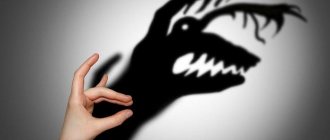Definition of this term
The concept of “cowardice” is understood as a person’s refusal to take any action or deed in a certain situation, the reason for which is fear. Such human behavior is considered a negative character trait. The word “cowardice” comes from the noun coward (in the Proto-Slavic language it means “one who shakes”). The words coward or cowardly are also its derivatives.
The main cause of cowardice is fear. It should not be confused with caution and must be distinguished from excessive caution. Caution is a human quality that means a particularly attentive attitude, increased vigilance. This is the ability to think several steps ahead, anticipating the consequences of your actions and the possible reactions of people. After all, the goal of caution is the successful implementation of planned plans, which is fundamentally inconsistent with cowardice.
What is the difference
There is a cause-and-effect relationship between the concepts of cowardice and fear. Cowardice is generated by fear, but not only by it. As we found out, everyone is scared, but not everyone is a coward. What else is behind cowardice:
- Weakness of character?
- Inability to manage yourself?
- Lack of courage?
- Lack of willpower?
All of the above to some extent.
The main difference between fear and cowardice is that fear is a psychological concept, while cowardice is a social concept. That is, a person and his mental nature experiences the emotion of fear. Cowardice is a label that society will stick on you if... And then everything that we talked about above. Moreover, for different times and different ethnic samples, the criteria for “designating” a person as a coward vary significantly.
If in medieval Japan a samurai who did not want to be caught in cowardice could rip open his stomach, then in the modern society of social networks and the Internet, in order not to be branded a coward, sometimes it is enough to stand up for someone in the comments on Facebook.
Simply put, any social concepts are conventions. If during the Great Patriotic War, soldiers of all ages going to the front line were considered brave men and heroes, and those who spent time in the rear for no reason were considered cowards. Nowadays, the situation is radically different. What was courage is now considered recklessness, and cowardice is considered prudence and intelligence.
Manifestation of cowardice. Examples
It should be remembered that fear itself is a natural defensive reaction for a living being. This is an instinct of self-preservation. But given many circumstances, it often takes strength to overcome fear. In many cases a person is able to overcome this feeling, but in some circumstances he is not.
An example is a case where the same person is afraid of heights, but will not be afraid to engage in single combat with a group of notorious scoundrels. Or, for example, showing cowardice in front of a boss, the same person will not be afraid to jump out of a plane with a parachute.
So what is cowardice? Mental weakness that prevents you from doing what needs to be done in the face of fear. It is important to be able to distinguish a coward from a normal person who is afraid of something. After all, not everyone should be considered as such if for some reason he experiences such a feeling. Since a coward is not capable of responsible actions at the right time, he is therefore inclined to commit a crime because of his fear. Therefore, a coward is considered a potential traitor who is capable of setting him up, slandering him, and throwing him into danger.
Fear has big eyes
All people and animals experience it. This is the essence of human consciousness. In unexpected situations, people are driven by the instinct of self-preservation. Fear is something that really exists. If a person is on an airplane that begins to shake, the appearance of a feeling of fear is quite normal, but if panic appears even at the thought of turbulence, this is already panic timidity, cowardice.
In emergency situations, the hormone adrenaline is released into the human body. It creates a feeling of confusion and slight panic. This is the feeling that a person has in a specific extreme situation. A person can control it, suppress it, although this is difficult and depends entirely on the level of danger.
Fear is caused by a sense of self-preservation
“Fathers and Sons”, “Garnet Bracelet”. Reckless courage and desperate cowardice
Writers often address this topic. You can find many examples of this in the literature. Let's take a look at some of them. Everyone knows Turgenev’s work “Fathers and Sons” from school. Using the example of Bazarov’s character, let’s consider the situation. The duel that took place, the reason for which was a kiss, describes the behavior and state of the heroes, for whom honor is not an empty phrase. Overcoming fear, the heroes defend their beliefs, although one kiss should not endanger a person’s life. Desperate cowardice and reckless courage became counterbalances to each other.
There is another remarkable example of cowardice in Kuprin’s work “The Garnet Bracelet”. The hero of the story is a petty official who is selflessly in love with a woman. But the fear of rejection prevents him from opening up to her. The heroine, in turn, fearing shocks in love and preferring a calm marriage, makes a choice in favor of another man. And only after the death of the man in love with her, she realizes that the true love in her life has passed her by.
Practical recommendations for combating fear and cowardice
The main problem in the fight against cowardice is that a person can control it only before the attack occurs. An algorithm of actions has been developed for this:
- Motivate yourself. To do this, on a piece of paper you need to write a list of those things that you are losing while you are ruled by weakness. A coward will never make his dream come true and will not be able to protect himself and his loved ones in case of danger. After this, motivation will appear. You also need to make a list of 30 points that describe what a person will gain when he overcomes panic fear.
- Study yourself and try to understand the reason for your cowardice, convince yourself that it is interfering with your life.
- Don't sit in front of the TV. An endless stream of information forces the brain to work in rush mode, which throws the nervous system out of balance. It's better to read a book or take a walk in the fresh air.
- Keep yourself busy. Remember what you love to do most. What brings you pleasure? Get busy with this.
- Model your body. This will give you confidence, raise your self-esteem, and your fears will go away on their own.
- Set yourself a goal: stop scolding yourself and hating yourself for your own cowardice. Having achieved it, move on to control your feelings. Create a personal code of courage and follow it.
The fight against cowardice is similar to training, where systematic and methodical behavior is also important. Look fear in the eye and begin a methodical fight against it.
"Eugene Onegin". Public opinion
Our favorite work by the brilliant Russian poet Alexander Sergeevich Pushkin describes a similar situation in which the main character Eugene Onegin finds himself. He receives a challenge to a duel from Vladimir Lensky, towards whom he does not feel any hostility, but, fearing condemnation from society, accepts the challenge. For fear of being branded a coward, Onegin becomes one.
The meaning of the word “cowardice” in this situation can be represented as the inability to do the right thing under fear of public opinion. In contrast, we can use as an example the act of Tatyana Larina, who, unafraid of the opinion of society, herself declares her love to Onegin. And years later she again confesses her love to him, but does the right thing, thereby proving that loyalty is not an empty phrase for her.
What is fear
In order to understand the situation, let's start with definitions. Fear is an emotional process based on the instinct of self-preservation, caused by real or imagined danger. Fear is a vital state of the body, which helps to exist in various conditions.
Complete absence of fear is a disease in which the amygdala (the area of the brain responsible for the formation of emotions) is disrupted. Therefore, every healthy person experiences the emotion of fear in certain (different for each) situations.
Conventionally, 3 levels of fear can be distinguished:
- Biological.
- Social.
- Existential.
If we draw analogies with Maslow’s pyramid, where needs were set according to levels, it is very easy to understand what we are talking about. Biological fears include those emotions that a person experiences when there is an immediate threat to life and health. At a social level, fear is caused by threats to self-esteem. The existential level is associated with the fact of human existence, its goals, meanings and finitude, as such.
Pathological forms of fears are called phobias. If fear is caused by objects (objects, phenomena, situations) that are not dangerous for most, and control over it becomes beyond the patient’s power, a diagnosis of phobic disorder is made.
The feeling of intense fear is accompanied by physiological manifestations of the autonomic nervous system. “A lump in the throat”, “the heart sinks into the heels”, “wobbly legs” - all these sensations are provided to us by the body, and we use them to track fear. In addition, from the side of cognitive perception - when we are overcome by “scary” thoughts, we experience feelings from mild anxiety to panic horror. And it doesn’t matter whether something actually threatens us, or whether it’s just our assumptions.
Quotes. Wisdom of life
An example of cowardice is the quote from Gilbert Keith Chesterton's "Train Station Prehistoric" which reads: "Noble men are vertebrates: they are soft above, but deep down they are hard. Mollusks are the modern cowards: they are hard on the outside, but soft on the inside.”
Or this wise quote from L.N. Tolstoy: “A cowardly friend is more terrible than an enemy, for you fear the enemy, but rely on your friend.” Shaw Bernard once said the following words on this occasion: “A person can find any reason to justify his actions, except for one, and for his crimes he also finds any justification, except for one, for his safety - any reason, except for one, and this alone is his cowardice.”
There is another very beautiful saying that I would like to cite here as an example: “A warrior dies once and always with dignity, but a coward dies thousands of times, every time he is afraid, and he always dies like a cowardly jackal.”
Synonyms. Meaning and examples
First of all, it should be noted that synonyms are words that are distinguishable by spelling and sound, but belong to the same part of speech and have a similar lexical meaning. In our case, the words timidity, fearfulness, and indecision can be considered synonyms for the word cowardice. The line between all these words is quite thin. To understand whether you are a coward or not, you need to get into an extreme situation. And if, overcoming your fear, you are able to move forward for some good purpose, you are not a coward, but a worthy person. Today it has been proven that fear can be corrected. A coward can be rehabilitated.










